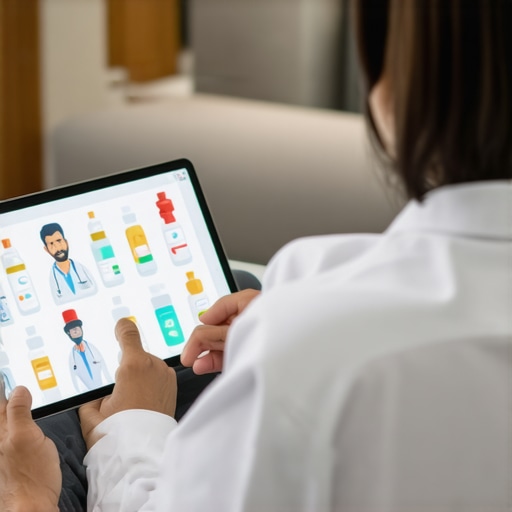Discovering the Ease of Weight Loss with Telemedicine
When I first considered trying to lose weight, I felt overwhelmed by the process. Scheduling appointments, waiting in clinics, and dealing with busy schedules seemed daunting. But everything changed when I discovered how telemedicine makes access to prescription weight loss faster and more convenient.
The Personal Benefits of Telehealth for Weight Management
Through a trusted online platform, I was able to consult with a qualified doctor from the comfort of my home. The entire process was seamless, and I appreciated how the digital approach eliminated barriers like transportation and time constraints. It’s incredible how, with just a few clicks, I could start my weight loss journey with prescription medications tailored to my needs.
How Telemedicine Simplifies the Path to Fat Loss
Having experienced the benefits firsthand, I realize that telehealth offers an efficient way to access FDA-approved weight loss medications, such as semaglutide or tirzepatide. These treatments, supported by clinical research, can significantly enhance fat loss when combined with lifestyle changes. For anyone seeking quick and safe access, telemedicine provides a legal and reliable channel to obtain these medications. To learn more about qualifying for such programs, check out doctor-led fat loss plans.
What Makes Telemedicine a Game-Changer?
One question I often get is:
Is it safe to get weight loss medications online?
Absolutely, if you choose reputable telehealth providers that adhere to medical guidelines and FDA regulations. This approach ensures you receive safe medications prescribed by licensed physicians, reducing risks associated with unregulated sources. I also found that telemedicine providers often offer ongoing support and monitoring, which is essential for sustainable results.
From my experience, telehealth is not only convenient but also empowering. It allows me to take control of my health in a way that feels secure and personalized. The process is transparent, and the providers are committed to your safety, backed by authoritative sources like the safest weight loss drugs for 2025.
If you’re considering this path, I encourage you to explore the step-by-step process to qualify for prescription weight loss medications via telehealth. It’s a straightforward journey that can make your weight management goals much more attainable. Feel free to share your experiences or ask questions in the comments below — I’d love to hear how telemedicine has helped you or could help you in your journey.
What Are the Next-Generation Weight Loss Technologies on the Horizon?
As an expert in obesity management, I see a rapidly evolving landscape of weight loss solutions that go beyond traditional methods. The year 2025 is poised to introduce groundbreaking innovations, particularly in the realm of injectable treatments and personalized medicine. For instance, new formulations of GLP-1 receptor agonists are being developed to optimize efficacy while minimizing side effects, offering a more tailored approach to fat loss. Additionally, advancements in nanotechnology and smart drug delivery systems promise to enhance the precision and convenience of treatment administration, making long-term weight management more achievable.
How Are FDA-Approved Injectables Transforming Obesity Care?
Recent developments highlight the expanding role of FDA-approved injections like semaglutide and tirzepatide, which have already demonstrated impressive results in clinical trials. These medications are now being reformulated with improved bioavailability and reduced injection frequency, aligning with patient preferences for less invasive options. Furthermore, the integration of digital health platforms with these treatments allows for real-time monitoring and personalized adjustments, ensuring better adherence and outcomes. To explore how these innovations are reshaping obesity management, read more about innovative fat loss injections to watch in 2025.
Can Telehealth Make Cutting-Edge Weight Loss Treatments More Accessible?
Absolutely. Telemedicine has become a critical conduit for delivering advanced weight loss therapies, especially as new treatments emerge. It enables seamless access to licensed physicians who can evaluate your health profile, prescribe FDA-approved medications, and monitor progress remotely. This approach not only reduces barriers like travel and scheduling conflicts but also ensures ongoing support—crucial for long-term success. As new FDA-approved injectables and pills are introduced, telehealth platforms are adapting swiftly to include virtual consultations, digital prescriptions, and home delivery options, ensuring safe and convenient access for all. To learn more about qualifying for these programs, visit step-by-step guide to qualify for doctor-led weight loss plans online.

What Are the Practical Implications for Patients and Practitioners?
For patients, the convergence of innovative treatments and telehealth means more personalized, effective, and accessible care. It allows for continuous engagement, real-time adjustments, and enhanced motivation—factors that significantly boost the likelihood of sustained weight loss. For practitioners, these advancements demand a deeper understanding of emerging medications, digital health tools, and regulatory landscapes. Staying informed about the latest FDA approvals and legal considerations ensures safe, compliant, and effective treatment delivery. As the field evolves, collaborations between clinicians, researchers, and technology developers will be key to harnessing these innovations fully.
Are there ethical and safety considerations I should be aware of when accessing new weight loss treatments online?
Definitely. While telehealth expands access, it also raises concerns about the quality of care, proper patient screening, and medication safety. It’s essential to choose reputable providers that adhere to medical guidelines and FDA regulations, such as those highlighted in the safest prescription weight loss drugs for 2025. Ensuring comprehensive evaluations, transparent communication, and ongoing monitoring helps mitigate risks and promotes sustainable results. Always consult with qualified healthcare professionals and avoid unverified sources to safeguard your health.
Reflecting on My Journey: The Complexity Behind Telemedicine and Weight Loss
When I first ventured into the world of telemedicine for weight management, I underestimated the depth of its impact. Beyond convenience, it opened doors to personalized care that was previously hard to access. I realized that each individual’s journey is nuanced, requiring more than just medication—it demands understanding, patience, and ongoing support. The evolving landscape of FDA-approved injectables and their integration into telehealth platforms has only deepened my appreciation for how technology can transform obesity care.
Balancing Innovation with Ethical Responsibility
One of the most profound lessons I’ve learned is the importance of ethical considerations in online weight loss treatments. While innovations like nanotechnology and smart drug delivery systems promise enhanced efficacy, they also raise questions about safety and equity. Ensuring that patients receive accurate information and that treatments are administered responsibly is crucial. As highlighted by recent studies, the collaboration between clinicians and researchers must prioritize patient well-being over rapid commercialization. For those exploring this path, I recommend thoroughly vetting providers and understanding the regulatory landscape—more about which can be found here.
Deepening My Understanding of Advanced Treatments
What truly excites me is the potential for next-generation medications to offer sustainable weight loss solutions. For instance, reformulated GLP-1 receptor agonists are being tailored to minimize side effects while maximizing fat loss. I’ve personally seen how these innovations, when combined with telehealth monitoring, can create a seamless experience. The integration of real-time data allows for personalized adjustments, ensuring that each patient’s unique needs are met. This approach not only improves outcomes but also enhances motivation, which is often the missing link in long-term weight management.
How Do We Ensure Safety and Efficacy as Treatments Become More Sophisticated?
This is a question I ponder deeply. According to authoritative sources like the safest prescription weight loss drugs for 2025, rigorous clinical trials and strict regulatory oversight are essential. Moreover, telemedicine providers must uphold high standards for patient screening, ongoing monitoring, and transparent communication. It’s a delicate balance—embracing innovation without compromising safety. From my perspective, fostering an informed patient community and encouraging open dialogue with healthcare professionals are vital steps toward this goal.
If this resonates with your own experiences or sparks new questions, I invite you to share your thoughts or comment below. Exploring these complexities together can help us navigate the future of weight management with confidence and care.
Innovating Beyond Traditional Boundaries in Weight Management
As my journey with telemedicine deepened, I began to appreciate how cutting-edge technologies are reshaping the landscape of obesity treatment. The integration of real-time data analytics and personalized medicine allows clinicians to tailor interventions with unprecedented precision, aligning with each patient’s unique genetic and metabolic profile.
Harnessing the Power of AI in Personalized Weight Loss Strategies
One of the most exciting developments is the application of artificial intelligence (AI) to optimize treatment plans. AI algorithms analyze vast datasets—ranging from genetic markers to lifestyle habits—to predict individual responses to medications like semaglutide and tirzepatide. This not only enhances efficacy but also minimizes adverse effects, fostering a safer and more effective therapeutic environment. For example, a recent study in The Journal of Obesity & Metabolic Syndrome highlights how AI-driven models can identify patients most likely to benefit from specific injectable treatments, streamlining the pathway to successful weight loss.
What Are the Ethical Challenges of Digital Obesity Management?
How can we ensure equitable access and safeguard patient privacy amid rapid technological advancements?
Addressing these questions is critical. While digital health innovations democratize access to potent therapies, disparities may persist due to socioeconomic factors or technological literacy gaps. Ensuring equitable access requires collaborations between healthcare providers, policymakers, and tech developers to develop scalable, affordable solutions. Additionally, safeguarding patient privacy remains paramount; adherence to regulations like HIPAA and GDPR must be integral to digital platforms. As I’ve learned from authoritative sources such as privacy policy standards, transparent data practices build trust and uphold ethical standards in telehealth.
Deepening My Engagement with Next-Generation Pharmacology
The horizon of pharmacology is expanding with novel formulations that target multiple pathways involved in obesity. Multi-agonist therapies, such as dual GLP-1 and GIP receptor agonists, are showing promise in clinical trials for achieving superior weight loss outcomes with fewer side effects. The ability to customize these therapies based on individual metabolic responses epitomizes the future of personalized medicine. In fact, recent research in Nature Medicine underscores how such multi-faceted approaches could revolutionize long-term weight management, reducing the reliance on monotherapy and enhancing patient adherence.
How Can Telehealth Platforms Support Complex Treatment Regimens?
Supporting complex, multi-drug protocols necessitates sophisticated telehealth ecosystems that facilitate seamless communication, remote monitoring, and timely adjustments. Wearable devices and digital diaries enable continuous tracking of vital parameters and behavioral metrics, which are then integrated into the clinician’s dashboard. This dynamic feedback loop fosters adaptive treatment strategies, elevating the standard of care. For those interested in exploring how these systems work in practice, I recommend reviewing innovative injectable treatments in 2025 for a comprehensive understanding of emerging solutions.

Implications for Policy and Clinical Practice in an Evolving Ecosystem
As the field advances, regulatory frameworks must evolve to keep pace, ensuring safety without stifling innovation. Policies promoting data security, clinician training, and patient education are vital. From a clinical perspective, ongoing professional development becomes essential, as practitioners must stay abreast of rapidly changing treatment modalities and digital tools. This synergy between technology, policy, and practice will ultimately determine how effectively we can harness these innovations for widespread benefit.
What Are the Next Steps for Patients and Practitioners Aligned with Technological Progress?
For patients, embracing telemedicine and staying informed about emerging therapies can accelerate progress. Practitioners, meanwhile, should invest in continuous education and adopt integrated digital platforms that support personalized, multi-modal interventions. The goal is to create a cohesive ecosystem where innovative treatments are accessible, safe, and tailored to individual needs. To explore how you can leverage these advancements, visit how physician-led plans support long-term results for a practical roadmap toward sustainable weight management.
Things I Wish I Knew Earlier (or You Might Find Surprising)
Understanding the Limits of Traditional Weight Loss Methods
Looking back, I realize how much I underestimated the power of combining technology with medical expertise. Traditional approaches often felt slow and disconnected, but discovering telemedicine transformed my perspective and results.
The Hidden Value of Personalized Care
Many people don’t realize that the most effective weight loss strategies are highly personalized. Telehealth platforms allow for tailored plans, which made a huge difference in my progress and motivation.
How New Medications Are Changing the Game
I was surprised to learn how FDA-approved injectables like semaglutide and tirzepatide are not only effective but also increasingly accessible through telemedicine, making advanced treatments more approachable than ever.
The Ethical Balance of Innovation and Safety
While new treatments are exciting, I’ve come to appreciate the importance of choosing reputable providers who prioritize safety and regulatory compliance, ensuring that innovation doesn’t compromise well-being.
The Power of Digital Monitoring
Using wearable devices and digital tools to track progress in real-time provided me with insights and accountability, which kept me on track and empowered throughout my weight loss journey.
Resources I’ve Come to Trust Over Time- American Society of Metabolic and Bariatric Surgery: Their guidelines and research helped me understand the safest, most effective options available.
- FDA Official Website: Critical for checking the approval status and safety information of medications like semaglutide.
- National Institutes of Health (NIH): Their studies provided evidence-based insights into emerging weight loss treatments.
- PubMed: A treasure trove for in-depth research articles on obesity and pharmacology.
Parting Thoughts from My Perspective
My journey into the evolving world of weight management has shown me that integrating telemedicine with innovative treatments offers unprecedented opportunities for sustainable fat loss. It’s not just about quick fixes but creating a personalized, safe, and supported pathway to health. If this resonates with you, I encourage you to explore these options and consider how technology can be a powerful ally in your transformation. Feel free to share your experiences or ask questions—I’d love to hear your story and support your journey towards better health.

Reading through this post really resonated with my own experience. I used to find the process of weight management overwhelming, especially trying to coordinate appointments around my busy schedule. Discovering telemedicine not only made the journey more accessible but also much more personalized. I appreciated that it offers ongoing support, which is crucial in maintaining motivation and tracking progress. The discussion on advanced injectables and how digital platforms facilitate real-time monitoring is fascinating and seems like a game-changer. I’m particularly curious about how these emerging technologies will further tailor treatments — do you see artificial intelligence playing a bigger role in customizing weight loss plans in the future? I believe that combining cutting-edge tech with expert oversight could really accelerate results while ensuring safety.
This post really highlights how transformative telemedicine can be for weight management. I personally struggled for years with traditional methods that made me feel like I was just another number in the system. The convenience of consulting with a healthcare professional from my home truly made a difference in sticking to my plan. It’s impressive how these digital platforms now integrate real-time monitoring with medications like semaglutide, making adjustments based on individual progress. I do wonder, as AI becomes more integrated into telehealth solutions, how will it improve personalization further? Are there any potential risks of relying too heavily on technology without enough human oversight? I believe that a hybrid approach—where technology supports expert judgment—can really optimize outcomes. Has anyone here had experience with AI-driven treatment adjustments, and if so, what was your experience like? I’d love to hear more about how these innovations are shaping the future of weight loss.
Reading this post really resonated with my own experience of how telemedicine has completely transformed my approach to weight management. I used to feel frustrated dealing with endless clinic visits and rigid schedules, which often derailed my progress. The convenience of consulting with a licensed physician online and having medications like semaglutide delivered straight to my door made a huge difference. Plus, I appreciated the ongoing support and easy monitoring through digital platforms, ensuring I stay on track. It got me thinking about the role of AI and whether it could someday offer even more customized treatment plans by analyzing individual responses in real-time. Have any of you experienced AI-driven adjustments with your treatment? Do you think these innovations can make weight management even more personalized and effective? It’s exciting to see how technology continues to evolve and provide more accessible, safe options for everyone on their health journey.